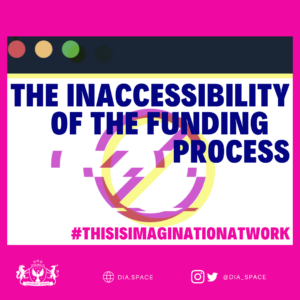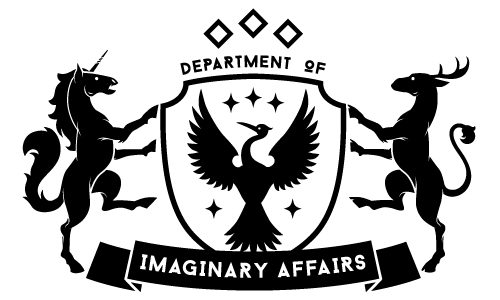Hey there!
Welcome to 2022! We have made it through the Gregorian and Lunar calendar new years and as a team, we are still working on finding our project groove despite coming in fast in January with more projects and grants to apply to than ever before. Not sure about how you’re doing but we are toggling between setting ourselves up for a year of success AND having compassion for when we don’t meet our own standards.
In the next few months, we will be sharing a blog series as a part of #thisisimaginationatwork around our experiences with a very structural part of nonprofit work – getting funding.
Ranting and sharing about relationships between funders and fundees and the funding process are not new to us, in 2019 I wrote a blog about what happens when we spend time imagining a vision for a project, write a grant, and then we don’t get it.
But this time, we can do something about it! We received funding to design The Public Imagination Fund and so as we do that work, we are unearthing, processing, and learning a lot of our own traumatic experiences in order to imagine “What might it look like for grant-writing to be filled with JOY?”
We start this blog series with a post from Ari. Next month, will be from Elvin.
Take (self) care,
Jenn
—-
 Having worked in the non-profit sector for a few years now, I have started to pick up on the rhythms and pace of community care work. The more I learn about the structures put in place by systems that govern the nature of this work, the more I realize what isn’t working. Knowing these things however don’t help prevent the heavy feelings that often accompany the realization of operating a system designed to burn you out.
Having worked in the non-profit sector for a few years now, I have started to pick up on the rhythms and pace of community care work. The more I learn about the structures put in place by systems that govern the nature of this work, the more I realize what isn’t working. Knowing these things however don’t help prevent the heavy feelings that often accompany the realization of operating a system designed to burn you out.
A major barrier I have experienced so far has been about the time that is actually allotted to do the work we set out to do within nonprofits. As much as I would like the majority of non-profit work to be centered on the communities it aims to support, I have found that most of it consists of convincing funders that our work is worthwhile and deserves funding. Not only does that involve exhausting invisible rules that have to be followed, it also often requires mining our own personal traumas to prove that we are worthy.
As a team, DIA has been thinking a lot about the funding process and what it allows space for (or doesn’t). We’ve had conversations about new funding opportunities being allocated to BIPOC community members with entirely white staff on the granting committees. We’ve talked about the lack of trust in relationships between funders and fundees. We’ve talked about organizations that are funded more often than others because of their connections and social power. All of these conversations have led us to think about what could be done to make the system more equitable.
As we’ve been going through our own process of applying for grants and trying to create inclusive, informative programming, I’ve started to notice several barriers and limitations that prevent us from being able to offer what we envision to the public. Some of the big questions that come up for me when applying and researching for grants are:
- How can grants be made more accessible for folx with learning disabilities or language barriers that prevent them from fully understanding what is required of them?
- How can relationships exist between funders and fundee’s in a way that allows for additional support after grants have been funded?
- How can the process of funding be made easier for folx who don’t have time to write the grants they need to carry out programming that requires thoughtful attention and care?
In my own experiences applying for grants, I have struggled with my personal network of connections, wondering if enough people would vouch for me in order for me to make a living creating theatre. I struggled with personal capacity while working on grants and figuring out how to work through conflict when disagreements with co-writers emerged. Overall, my experiences with grant writing have been emotionally taxing, making me doubt my own abilities and questioning whether or not I am worthy of being funded.
These feelings get further aggravated with grant writing specifics that have become the norm. So much of the process of grant writing today is about appeasing white granting committees before prioritizing the needs of communities we offer programs to. Grant jargon, proper grammar and word counts become more important than the actual program itself. In addition, there are very few opportunities for racialized folx to get funding through major granting bodies, pitting us against each other to maintain our livelihoods.
The funding process as it exists today enables white supremacist practices and thinking, including prioritizing productivity over rest and care. Grant writing requires hours of work all for a chance to be rewarded with funding. Fix The Form highlights various issues with grant forms that unnecessarily make grant writing harder, such as repetitive questions, long word counts, and large amounts of often unpaid work required to complete the grant writing process.
All of these issues make me curious about potential alternatives. What would the ideal funding process look like? How can funding decision making be more trauma-informed? Or, more specifically, how do we transform trauma-informed ideas into practices that allow for better care for the community? While there have been some conversations on improving design methods to be more trauma-informed, so many of those conversations are still in theoretical phases. What are practical, tangible things that we could be doing to make funding practices more accessible to marginalized communities?
As I get more familiar with grant writing, I am curious about the future of funding for nonprofits and how we can collectively work towards creating a better system that honours the time that goes into grant-writing. I am curious about how the entire process can decentre white supremacist thinking to be structured in a more holistic and equitable way. Most importantly, I am curious about how we can create a more trauma-informed approach to the funding process, where stories aren’t forced out of us to validate our worth, but instead, safe and brave spaces are created and fostered to encourage sharing stories as knowledge, as wisdom, and as reclaiming our histories and identities.
